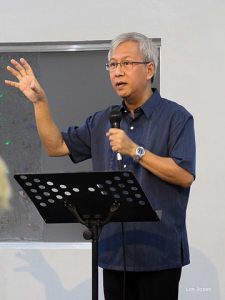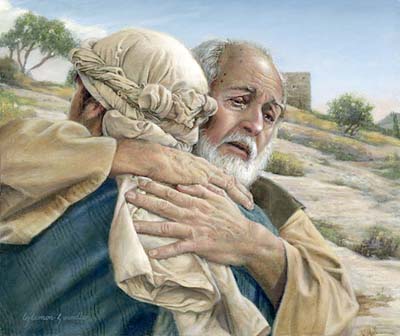Without realizing it, many of us somehow misinterpret Scripture by misunderstanding context. Sometimes we quote a favorite verse to support our view but without realizing it, unintentionally of course, we sometimes miss the point.
Understanding Scripture
John 6:44 is one good example of an often-quoted verse. In this verse Jesus said, “No one can come to me unless the Father who sent me draws him, and I will raise him up at the last day.
Of course, we can easily understand this verse and its meaning is quite clear. That is, if this verse — this sentence — is all by itself and there are no other verses surrounding it. But there lies the problem. Interpreting a verse in isolation — apart from its surrounding context — can mislead us into a wrong interpretation.
Bible Interpretation
We have to remember a sound principle in interpretation that: Words or phrases derive its meaning depending on how it is used in a particular context.
Another way of saying it is that: In interpretation, the message of the text is not conveyed through single words alone but through words in relationship with each other as they occur in a specific literary context.
Is God Saving Only a Few?
Without considering its surrounding context, we can misunderstand John 6:44 to mean that God is limiting the number of those whom he will save or elect.
Some interpret this verse to mean that only a few elected ones are predestined to be saved and the rest of humanity will be damned or predestined in hell.
Is God Saving All?
On the other hand, some people believe that verse 44 is talking about God forcing people to be saved. They get their idea by focusing on the word draw which they translate as drag. That is, God will drag people to be saved whether they like it or not.
As you can see, various views are generated by this one verse alone. But what is Jesus really telling us in John 6:44? Let’s find out and check its surrounding context.
Getting the Context
It is always best to read the whole chapter to get the larger context. In John 6:41 we find Jesus claiming to be the Bread of Life or the Bread that came down from heaven. The Jews began to grumble and complain when Jesus claimed divine status by saying that he is the Bread from heaven. It was tantamount to blasphemy according to the Jews.
On this occasion, Jesus was in his very own hometown in Capernaum and he was talking to fellow Jews who knew him and his parents, his brothers and sisters and maybe his relatives too. For these fellow townmates, Jesus was just one of the guys in town and they knew him. It was difficult for them to just suddenly accept Jesus’ claim that he is the Bread of Life that came down from heaven.
Jesus’ reply to the Jews was that they should not grumble (verse 43) if many people are coming to him. Jesus said that it was the Father who was drawing these many people to come to him — the Bread of Life (verse 44). Yes, the Father was the one inviting, enabling and drawing everyone to come to Jesus, the Bread of life. God opens our minds so that we will come to Jesus. As Jesus began to preach all over the place, he affirmed his divine status as the Bread of life. That is the surrounding context of John 6:44.
Everyone is Invited!
My main point in this blog is to show that God was not limiting the number of people who are drawn to him. Most people assume this is the meaning of John 6:44 when reading it outside of its surrounding context. But in reality, God was inviting, enabling and drawing everyone to come to Christ — the Bread of life!
This very verse which some people use to support a view that only a few will be saved or only a few are elected at this time is a verse that tells us that God wants to include and save all! God loves the whole world (John 3:16)!
Verse 40 is interesting and is quite clear: “For my Father’s will is that everyone who looks to the Son and believes in him shall have eternal life, and I will raise him up at the last day.” Please take note that verse 40 is part of the immediate context and should not be disregarded! This is God’s open invitation to all!
Please also take note of Verse 45: “It is written in the Prophets: ‘They will all be taught by God.’ Everyone who listens to the Father and learns from him comes to me.” (John 6:45)
Jesus was simply saying in verse 44 that the reason why people are coming to Jesus is because the Father has enabled them (John 6:65). No one could come to Jesus if the Father has not enabled them. That is, God opens their minds to see and understand.
This does not mean that people are dragged and forced against their will. The context is clear. One has to “look to the Son” and believe (verse 40). He has to listen or take heed and obey (verse 45).
Christ Will Draw All Men To Himself
Clearly then, God is not limiting the number of those whom he will save. The opposite is intended by Jesus Christ in John 6:44. God wants to draw all men to himself (John 12:32). He is not willing that any should perish but that all should come to repentance (2 Peter 3:9).
This is the context of John 6:44, the context of the whole book of John and the context of Scripture viewed from a Christ-centered point of view. You are already loved (John 3:16)! You are already accepted! You are already included! You already belong to Jesus Christ! God has already reconciled you to himself! Therefore be reconciled back to God! Therefore believe it and become who you really are in Jesus Christ!
God is not limiting the number of those who will be saved. Everybody is invited to come and enjoy life and love in Jesus Christ! Therefore accept God’s acceptance of you!
Photo credit: Google















